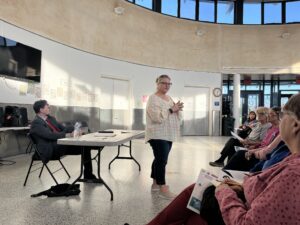Nicholas Edelson, a lawyer and guest speaker at the April 20th meeting of the Madison-Marine-Homecrest Civic Association, spoke to residents about end-of-life legal documents.
Planning ahead is important, and Edelson told attendees that some of the most important documents are the will, power of attorney, healthcare directive, joint tenants’ rights of survivorship and trusts. People should begin putting these documents together before they are near the end of their lives, as Kings County Court takes a long time to process everything.
A will is a document created with a lawyer that distributes a person’s property upon their death. For the purpose of a will, “property” includes only land and money.
Wills can be written or amended — changes to wills are called codicils — as many times as needed, with older copies being invalidated with each new will. People should destroy all copies of invalidated wills immediately after their new will is created to avoid complications.
A will should never be unstapled; a court will not accept it, because someone could have slipped an extra page into the stack that wasn’t authorized to be in the will by the deceased. The bottom of each page also has to be initialed.
You should make multiple copies of your will and give a copy to your executor. The executor is the person, bank or trust you name in your will to carry out your wishes after you die. The original copy of your will, however, should remain in a fireproof box or wall safe.
If a person wants to distribute their personal belongings to specific people upon their death, that does not go into a will. Those instructions go into a letter to the executor of your will. In this letter, you can assign jewelry, furniture and other possessions to go to specific people after you pass.
The issue with wills is that they must be probated through Surrogate Court in the county in which the deceased lived — and in Brooklyn that takes a very long time.
Probate is the legal process where, after your passing, the terms of your will are approved by a judge and the property and possessions in the will are given out to your beneficiaries after your debts are paid off. A beneficiary is the person you leave land, money or possessions to.
To avoid having to go through the very long probate process — which could take upwards of two years — you can leave your land to your beneficiary through alternative methods.
You can list your beneficiaries on the deed of your home, or homes, as a joint tenant with rights of survivorship. By making a person a joint tenant with survivorship on your deed, you are saying that you jointly own the home with them.
If you were to die first, they would automatically assume sole ownership of the house. If they were to die first, you would automatically assume sole ownership of the house. This works the same with more than two people, meaning you can have more than two joint tenants. Each time a person passes, the joint ownership automatically is assumed by the remaining living people on the deed, until there is only one living person left who assumes sole ownership.
Alternatively, you can give your beneficiaries ownership of your home through a life estate deed. This means you transfer ownership of your home to someone else but reserve the legal right to live there until you die. This is another way to avoid probate.


